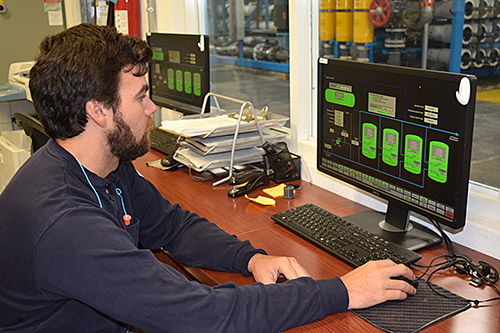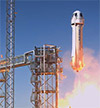While many small Caribbean economies were growing nicely before COVID-19 arrived, the World Bank reports that the region’s economy shrank by 8.6 percent in 2020, due largely to the pandemic collapse in tourism. Forecasts optimistically suggest that 2022 will be a decent year — not up to 2019 standards, but two thirds to three quarters of the way there. But a full recovery could still be two or three years away.
A U.S. Connection
Fortunately, there’s no shortage of Caribbean destinations that offer a lot more than just fun in the sun. Take the U.S. Virgin Islands as an example. It’s an unincorporated territory of the United States encompassing a few dozen islands and cays, the main islands being St. Croix, St. John, and St. Thomas. True, some 60 percent of the gross domestic product depends on tourism, but that means roughly 40 percent involves something other than tourism, including agriculture/agribusiness, manufacturing, professional services, and financial services.
Businesses are drawn to the U.S. Virgin Islands for a multitude of reasons, starting with the fact that there are U.S. connections. As a U.S. territory, the dollar is what’s spent there, manufactured goods can be labeled “Made in USA,” and there are shipping advantages. Imports are duty-free, and exports of locally made goods to the U.S. are free of duties and quotas.
There are also wide-ranging tax incentives that will feel quite familiar to American businesses. “We are the only jurisdiction under the U.S. flag that can currently offer qualified corporations doing business in the U.S. a 90 percent reduction of their corporate federal income tax liability, and residents a 90 percent reduction on the dividends or pass-through income from approved businesses activities,” says Wayne L. Biggs Jr., CEO of the U.S. Virgin Islands Economic Development Authority.
Businesses are drawn to the U.S. Virgin Islands for a multitude of reasons, starting with the fact that there are U.S. connections. “This is made possible as a result of the congressionally approved mirror tax system that the territory operates under, and the fact there are no other state or local income taxes,” Biggs continues. The impacts, he says, include higher profits, more ability to reinvest in the business, and benefits for owners and large shareholders.
The territory of Puerto Rico also is strong in U.S. connections and the related benefits. The U.S. dollar is the official currency there, too, and it’s covered by U.S. federal law (including such important areas as protection of intellectual property and the benefits of American banking regulations). As with the U.S. Virgin Islands, goods manufactured in Puerto Rico are considered “Made in USA,” and lots of local benefits are supported by the national business infrastructure of the mainland U.S.
Like other Caribbean locations, Puerto Rico continues to diversify its economy beyond its obvious tourism assets. It has, for example, a strong pharmaceutical sector that has been around for more than half a century and continues to build upon itself. One of the latest wins was an announcement of plans by the Indian pharmaceutical manufacturer Aurobindo Pharma Limited to locate operations in Puerto Rico under the name Auro PR Inc. It’s about a $100 million investment that promises to create 500 jobs in the first three to five years.
“The company is leveraging our available talent, resources, and capabilities as a world leader in bioscience manufacturing to make meaningful advancements in the sector,” according to Rodrick Miller, CEO of Invest Puerto Rico.
All that said, there’s no resting on laurels in the business of economic development. For example, despite the U.S. Virgin Islands’ successful history in everything from tourism to rum manufacturing, its economic leaders are focused on a more diverse future. Their Vision 2040 initiative is targeting several industries that are a good fit and offer growth opportunities. For example, the coastal/ocean resources sector is a natural target that includes marine industries along with the medicinal and nutritional sectors, among others.
Professional and technology services can tap into the territory’s workforce advantages linked to local training and higher education resources, as well as strong broadband access. The R&D sector is a target, especially activities linked to such things as healthcare, agri-tech, and the ocean — a helpful resource is RTPark, the University of the Virgin Islands Research and Technology Park.
Goods manufactured in Puerto Rico are considered “Made in USA,” and lots of local benefits are supported by the national business infrastructure of the mainland U.S. Meanwhile, Invest Puerto Rico, the island’s economic development organization, is out with a new brand campaign aiming to welcome what it sees as “game-changers” looking for ideal relocation or expansion opportunities. “We have refined the island’s value proposition based on the sectors in which we are most competitive,” according to InvestPR’s chief marketing officer, Nicole Vilalte. Beyond biosciences, that focus includes such sectors as technology and IT, finance and insurance, advanced manufacturing, professional services, and various creative industries.
A Wealth of Opportunity
All of this said, there’s a wealth of opportunity in Caribbean destinations that don’t have the same strong U.S. ties. Barbados, for example, is projecting a robust economic recovery this year, following 1.4 percent growth last year. Like so many other places, tourism there took a pandemic hit and remains at risk as long as new coronavirus variants are a possibility. But the nation has strong human and financial resources, reports the governor of its central bank, Cleviston Haynes, in a report on recent economic performance.
The attractive location, in fact, has helped Barbados draw a solid base of knowledge and skills attractive to the international business and financial services sectors. Its Welcome Stamp program means “global digital nomads” can work amid the Caribbean beauty for at least a year without being burdened by local income taxes or other immigration requirements. Barbados, already a Caribbean leader in blockchain and other financial technologies, is building further outreach through such advanced ideas as a “metaverse embassy” project to help spread its techie reputation.
The Dominican Republic boasts the region’s largest economy, according to the U.S. Agency for International Development. The World Bank notes that it has had an ambition to reach “high-income” status by 2030 and was well on its way before the pandemic hit and brought with it the nation’s first recession in nearly two decades. Economic growth is back but still below its potential.
Barbados is building further outreach through such advanced ideas as a “metaverse embassy” project to help spread its techie reputation. One could say that all this is still just a small portion of the location and expansion opportunities in the nations of the Caribbean Community and Common Market and other nearby states. Here are just a few more examples:
- Turks and Caicos aims to build on its tourism draw by attracting light manufacturing (including businesses that supply the whole region’s hospitality sectors). It also has for decades had legislation governing financial services, and it has maintained an ongoing commitment to strengthening the legal and regulatory environment needed to make it a safe and secure place for offshore finance.
- According to the World Bank, Jamaica is the largest island in the English-speaking Caribbean, with an upper-middle-income economy but a high level of public debt. The International Monetary Fund has identified growth potential in such areas as mining, construction, and agriculture, and local economic development officials are also working to build upon strengths in manufacturing, digital services, energy, and other sectors.
- The Bahamas Investment Authority states the obvious that tourist development is a top target. But there are numerous other sectors where opportunity is good, from technology and data processing, to agribusiness and food processing, light manufacturing and pharmaceuticals, banking and insurance, and repairing ships that sail the Caribbean.
- The World Bank points to natural resources as a significant ongoing opportunity in the twin island state of Trinidad and Tobago, which has enjoyed comparatively high incomes. Oil and gas production are key, along with ores and mineral fuels, but it has also seen growth as a financial center.




